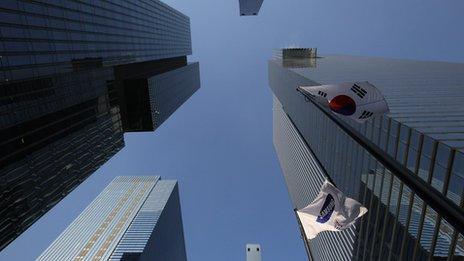Park Geun-hye: Can the new president fix South Korea's economy?
- Published
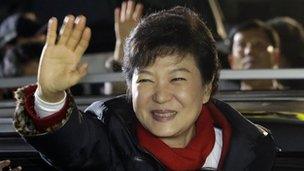
Park Geun-hye is taking charge of South Korea at a time when its economic growth has been slowing
Getting behind the wheels of an economy in a slide is a tough task at the best of times. Doing so when various growth engines are either sputtering or grinding to a halt, makes it even tougher.
That is exactly the situation that South Korea's new President Park Geun-hye faces as she takes charge of Asia's fourth-largest economy.
Admired and envied for years of economic expansion and the way it emerged from the Asian financial crisis of 1997-98, South Korea's growth seems to be running out of fuel.
The fact that in her first policy agenda for the next five years, unveiled last week, Ms Park did not set any specific growth target for the economy highlights just how complicated the task of reviving growth is likely to be.
Slowing exports
Amongst her biggest concerns - and one that she arguably has little control over - is the slowdown in exports, which accounts for more than half of South Korea's overall economic output. Contraction in key markets such as the US and the eurozone has hurt.
Although there was a pick up in exports in January, analysts warn that global economic conditions continue to remain fragile and that shipments may be hit if the situation in any of the key markets deteriorates.
There are now concerns that exports may also be undermined by the recent currency movements.
The Japanese yen has weakened nearly 15% against the US since November, making Japanese goods cheaper for foreign buyers.
Meanwhile, the Korean won has risen nearly 10% against the US dollar since May, making Korean goods more expensive.
And with Korean and Japanese firms competing against each other in the same markets, there are fears that Korean goods may lose out due to affordability.
'Longer term strategy'
However, there are some positive signs as well, not least from demand from within Asia, especially China.
China has been trying to spur domestic consumption in an attempt to rebalance its own export-led economy.
Some analysts say that rising demand from China in the coming years is likely to help drive up South Korean exports.
"As demand from China rises, a part of that is going to be for South Korean products," says James Rooney chief executive of Market Force Company, a Seoul-based consultancy firm.
"South Korea has engaged its economy quite well with China to take advantage of that."
But others warn that China is facing its own set of challenges on both the domestic and global front, and that South Korea should not pin all its hopes on Chinese demand to sustain its exports sector.
Some analysts say that the new government needs to introduce policies that encourage research and development, so that firms develop new products and create a niche market.
"This could be in the green energy sector or even the services sector," says Kwon Young-sun, an economist with Nomura.
However, Mr Kwon warns that such moves are unlikely to provide an immediate boost to exports.
"It is more a longer term strategy and the results will take some time to seep through," he explains.
Domestic conundrum
The other big challenge for Ms Park is how to spur domestic demand in the country, where her policies are likely to be constrained by the ballooning household debt.
Ironically, the problem has its roots in the way South Korea emerged from the Asian Financial Crisis in the 1990s - by boosting lending to families and individuals.
Since the crisis, household debt in South Korea has grown by an average of 13% a year, almost twice as fast as the country's gross domestic product (GDP).
It reached a record 959.4tn won ($880bn; £580bn) last quarter. That is equivalent to 164% of disposable income.
That combined with the fact that the real estate market, where a lot of South Koreans have invested this debt, has almost stagnated has got policymakers worried.
While so far there are no real fears of a property market crash, policymakers want to avoid reaching a situation where those fears becomes real.
What that essentially means is that the new government cannot afford to lend its way to growth.
Analysts say that with many households already having high levels of debt, any further borrowing may see a rise in defaults in the long run, especially when interest rates go up.
"At some time in the near future, the economy will start to grow, demand will rise and we will see the inflation rates go up," says Nomura's Mr Kwon.
"As a result, if interest rates need to be raised, the burden on South Korean's households will increase," he adds.
According to some estimates, nearly 90% of loans in the country have a variable interest rate, which means that any rise in the cost of borrowing will impact majority of South Korean households.
"As they pay more to service their debt, households are likely to cut back on spending which in turn will hurt the economy," Mr Kwon explains.
Economic democracy
However, the most sensitive challenge she faces is the call for reform in the way South Korea's big family owned businesses, also know as chaebols, are run.
These businesses, which include names such as Samsung, LG and Hyundai, have been a key driver of the country's economic rise in the past years.
They generate about half the country's gross domestic product
But they are facing increased criticism over allegations that they have hurt the growth of smaller and medium sized firms in the country.
The criticism is centred around various parts.
To begin with, some analysts allege that the big business houses get favoured access to capital.
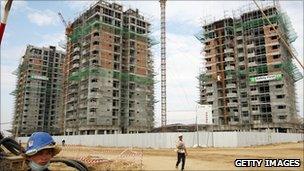
A stagnant property market has added to concerns over South Korea's household debt levels
"The chaebols may not always have the best ideas, or the best use of money, but it always comes to them first," says Mr Rooney of Market Force Company.
At the same time, many of the smaller firms in South Korea supply goods to these big business groups.
There are allegations that given their size and importance as a customer, these groups squeeze the smaller firms and hurt their growth and profits and some cases even cause job losses.
"The smaller businesses do not have much cash left at the end of the day to invest towards expanding their business or give wage growth to their employees," says Mr Rooney.
With a widening income gap, rising prices and slowing economic growth, calls for reforming the chaebols have also become a key political issue.
During her election election campaign Ms Park had talked about so-called 'economic democracy'.
"We haven't paid enough attention to fairness," she had remarked.
"[Big companies] can invest and create jobs, but they also have some bad practices - they concentrate their business among their own groups, they snatch technology from small companies, and they enforce prices."
But there are fears that a sharp slowdown in economic growth may see her hold back on any reforms on this front, to ensure that the big growth engines keep tugging along smoothly.
- Published19 December 2012
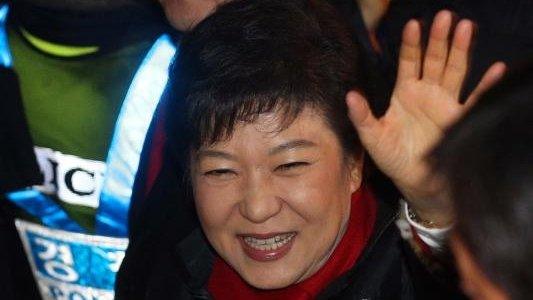
- Published6 April 2018
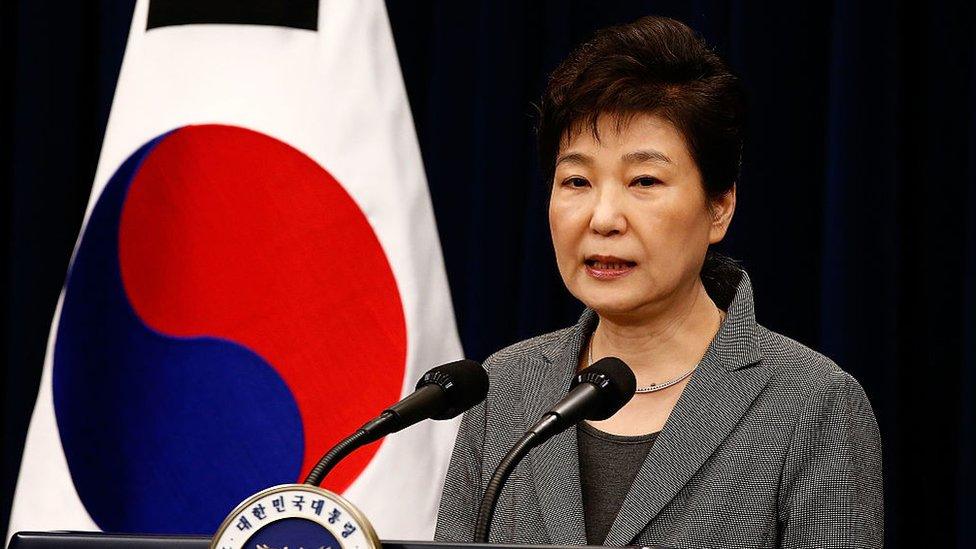
- Published18 December 2012
